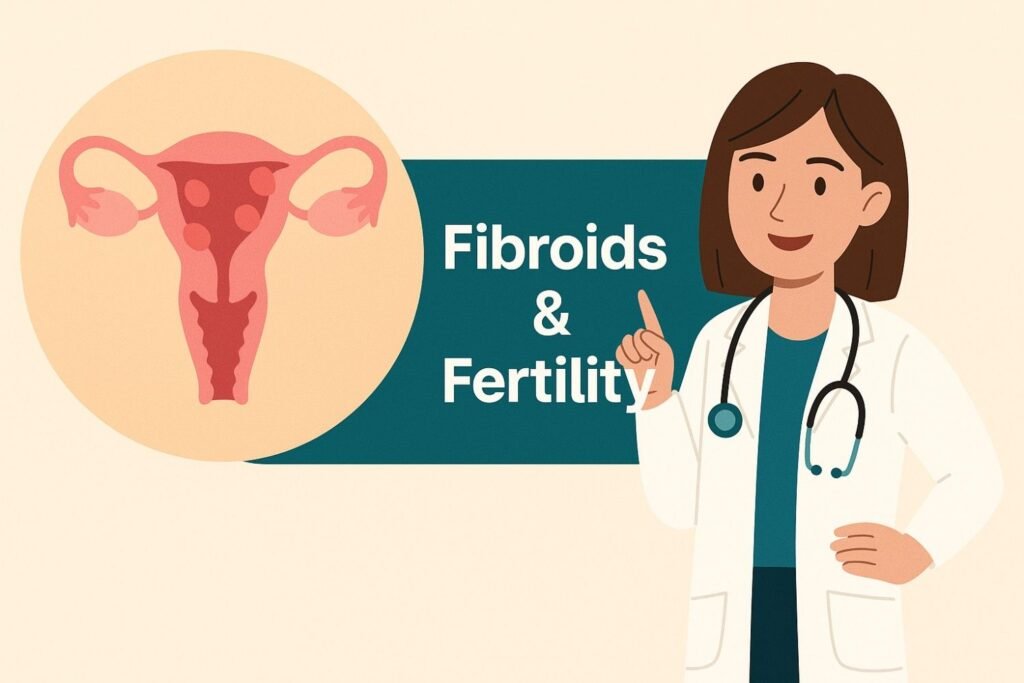Uterine fibroids are one of the most common reproductive health concerns in women of reproductive age. These non-cancerous growths in the uterus can range in size and number — and while many women with fibroids experience no symptoms, others may face challenges when trying to conceive.
In this blog by Nex IVF and Fertility Centre, we’ll explore how fibroids affect fertility, common symptoms, and treatment options available to improve your chances of pregnancy.

What Are Uterine Fibroids?
Uterine fibroids, also known as leiomyomas or myomas, are benign tumors that develop in or around the uterus. They vary in size from as small as a seed to as large as a melon. Fibroids can grow:
- Inside the uterine cavity (submucosal)
- Within the uterine wall (intramural)
- On the outer surface of the uterus (subserosal)
Do Fibroids Affect Fertility?
Not all fibroids affect fertility. However, location and size are key factors. Here’s how fibroids may impact your ability to conceive or maintain a pregnancy:
- Block Fallopian Tubes: Large fibroids can obstruct the fallopian tubes, preventing the sperm from reaching the egg.
- Disrupt Implantation: Submucosal fibroids can distort the shape of the uterine cavity, making it difficult for a fertilized egg to implant.
- Impact Blood Supply: Fibroids can interfere with the blood supply to the embryo, affecting early pregnancy development.
- Increase Miscarriage Risk: Studies suggest a higher risk of miscarriage in women with certain types of fibroids.
Common Symptoms of Fibroids
- Heavy menstrual bleeding
- Prolonged periods
- Pelvic pain or pressure
- Frequent urination
- Constipation
- Pain during intercourse
- Difficulty conceiving
However, some women remain asymptomatic and only discover fibroids during routine ultrasounds or fertility evaluations.
Diagnosing Fibroids
At Nex IVF and Fertility Centre, we use advanced diagnostic tools to detect and assess fibroids, including:
- Pelvic ultrasound
- Transvaginal ultrasound
- Hysterosonography (saline sonogram)
- Hysteroscopy or MRI, in complex cases
Treatment Options to Improve Fertility
The right treatment depends on the size, location, and severity of symptoms. Options include:
1. Medication
- Hormonal therapies to shrink fibroids temporarily (not recommended for long-term fertility)
- NSAIDs to manage pain (do not affect size or fertility directly)
2. Surgical Options
- Myomectomy: Surgical removal of fibroids while preserving the uterus — ideal for women who want to conceive.
- Hysteroscopic Myomectomy: Minimally invasive removal of fibroids inside the uterine cavity.
Note: Uterine artery embolization and hysterectomy are not recommended for women seeking fertility.
Can You Get Pregnant with Fibroids?
Yes! Many women with fibroids conceive naturally and have healthy pregnancies. However, if you’re struggling to conceive or have had multiple miscarriages, it’s important to consult a fertility specialist.
How Nex IVF and Fertility Centre Can Help
At Nex IVF, our fertility experts provide:
- Thorough evaluation of fibroids and fertility impact
- Personalized treatment plans
- Advanced reproductive technologies including IVF after myomectomy
- Compassionate support throughout your fertility journey